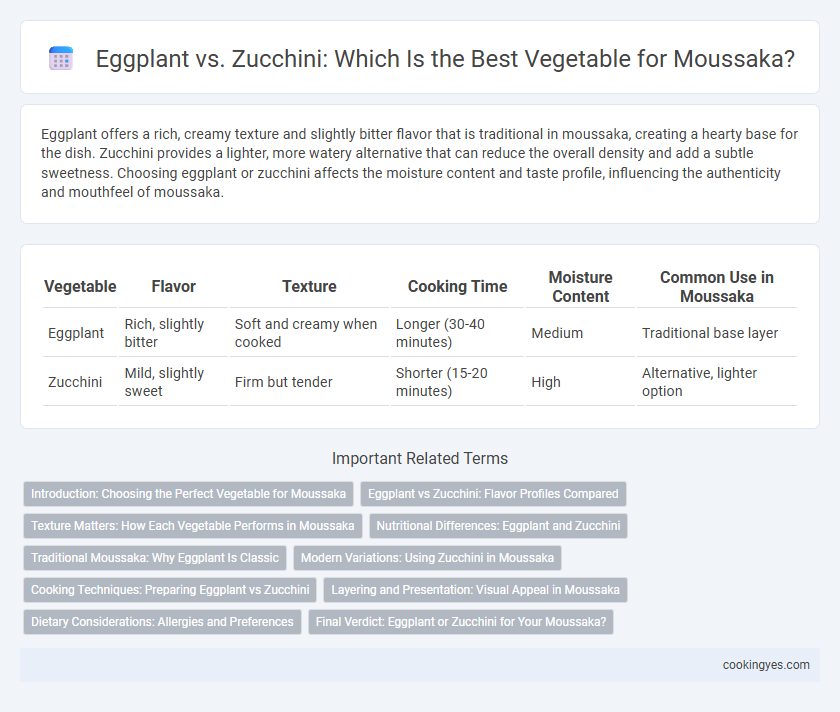Eggplant offers a rich, creamy texture and slightly bitter flavor that is traditional in moussaka, creating a hearty base for the dish. Zucchini provides a lighter, more watery alternative that can reduce the overall density and add a subtle sweetness. Choosing eggplant or zucchini affects the moisture content and taste profile, influencing the authenticity and mouthfeel of moussaka.
Table of Comparison
| Vegetable | Flavor | Texture | Cooking Time | Moisture Content | Common Use in Moussaka |
|---|---|---|---|---|---|
| Eggplant | Rich, slightly bitter | Soft and creamy when cooked | Longer (30-40 minutes) | Medium | Traditional base layer |
| Zucchini | Mild, slightly sweet | Firm but tender | Shorter (15-20 minutes) | High | Alternative, lighter option |
Introduction: Choosing the Perfect Vegetable for Moussaka
Eggplant is the traditional vegetable for moussaka, prized for its rich, creamy texture and ability to absorb the aromatic spices and tomato sauce. Zucchini offers a lighter, milder alternative with a slightly firmer bite, providing a fresh contrast to the dish's savory layers. Both vegetables influence the final flavor profile and moisture content, making the choice crucial for an authentic or customized moussaka experience.
Eggplant vs Zucchini: Flavor Profiles Compared
Eggplant offers a rich, slightly bitter flavor with a creamy texture when cooked, making it a classic choice for moussaka that absorbs spices and sauces well. Zucchini has a milder, slightly sweet taste and a firmer texture that provides a lighter, more subtle vegetable layer in the dish. The choice between eggplant and zucchini impacts the overall depth of flavor, with eggplant contributing more intensity and zucchini offering a delicate balance.
Texture Matters: How Each Vegetable Performs in Moussaka
Eggplant offers a creamy, tender texture that absorbs the rich tomato and meat sauce, creating a harmonious blend in moussaka. Zucchini, with its higher water content and firmer bite, provides a slightly crisp contrast but may release moisture that can affect the dish's overall consistency. Choosing eggplant enhances the traditional velvety mouthfeel, while zucchini adds a fresh, lighter texture for a more varied vegetable profile.
Nutritional Differences: Eggplant and Zucchini
Eggplant in moussaka offers higher fiber content and rich antioxidants like nasunin, supporting heart health and brain function, while zucchini provides more vitamin C and potassium, enhancing immune defense and muscle function. Eggplant's slightly higher calorie count comes primarily from its fiber and carbohydrate content, whereas zucchini is lower in calories and carbohydrates, making it a lighter choice. Both vegetables contribute essential nutrients, but eggplant excels in antioxidants, and zucchini shines in vitamins and minerals, influencing the dish's nutritional profile.
Traditional Moussaka: Why Eggplant Is Classic
Traditional moussaka relies on eggplant for its rich, creamy texture and ability to absorb the layers of spiced meat and bechamel sauce, which zucchini lacks due to its higher water content and firmer consistency. Eggplant's slightly bitter flavor balances the savory meat mixture and enhances the dish's depth, making it the classic vegetable choice in authentic Greek recipes. While zucchini offers a lighter alternative, it does not replicate the traditional moussaka's signature taste and mouthfeel that eggplant provides.
Modern Variations: Using Zucchini in Moussaka
Modern variations of moussaka often substitute zucchini for traditional eggplant to create a lighter, lower-calorie dish while maintaining rich Mediterranean flavors. Zucchini offers a firmer texture and slightly sweeter taste that absorbs the savory bechamel and spiced meat sauce effectively. This adaptation appeals to health-conscious eaters and adds a fresh twist without compromising the dish's classic layered structure.
Cooking Techniques: Preparing Eggplant vs Zucchini
For moussaka, eggplant is traditionally sliced and typically salted to reduce bitterness before being grilled, baked, or fried to achieve a tender, smoky flavor and rich texture that holds up well in the layered dish. Zucchini, in contrast, requires lighter cooking methods like sauteing or quick roasting to prevent excess moisture release, ensuring it maintains structural integrity and avoids sogginess in the moussaka. Proper prep techniques for each vegetable are crucial to balancing moisture content and texture, ultimately enhancing the dish's overall mouthfeel and flavor complexity.
Layering and Presentation: Visual Appeal in Moussaka
Eggplant provides a rich, creamy texture and deep purple color that creates distinct, visually appealing layers in moussaka, enhancing its traditional presentation. Zucchini offers a lighter green hue and firmer consistency, contributing to a fresher look but less pronounced layering contrast. The choice between eggplant and zucchini significantly affects the dish's aesthetic, with eggplant emphasizing classic richness while zucchini adds a vibrant, modern touch.
Dietary Considerations: Allergies and Preferences
Eggplant is the traditional vegetable in moussaka, valued for its rich texture and flavor, but zucchini serves as an excellent alternative for those allergic to nightshades or seeking a milder taste. Zucchini's lower carbohydrate content makes it suitable for low-carb diets, while eggplant's higher fiber supports digestive health. Both vegetables accommodate vegetarian and gluten-free dietary needs, allowing for versatile customization based on allergy concerns and personal preferences.
Final Verdict: Eggplant or Zucchini for Your Moussaka?
Eggplant remains the classic choice for moussaka, offering a rich, creamy texture and slightly bitter flavor that complements the savory meat sauce perfectly. Zucchini provides a lighter, less oily alternative with a milder taste, which can be preferable for those seeking a healthier or less intense vegetable layer. For an authentic, traditional moussaka experience, eggplant is recommended, while zucchini serves well in a lighter, modern variation.
Eggplant vs zucchini for moussaka vegetables Infographic

 cookingyes.com
cookingyes.com